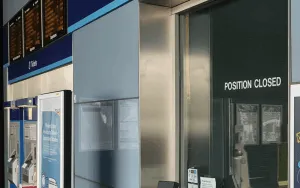The rail regulator has revealed a series of draft measures designed to force the industry to improve the assistance it provides to disabled passengers.
Many of the proposals suggested by the Office of Rail and Road (ORR) yesterday (Wednesday) aim to address key concerns that have been highlighted publicly by disabled campaigners.
They include measures to make it less likely that users of mobility scooters will be prevented from boarding trains, improvements to information on whether on-board accessible toilets are out-of-order, better training for staff – with disabled people involved in its delivery – and measures aimed at ensuring that more rail replacement services are wheelchair-accessible.
There is also the possibility of a significant reduction in the standard notice required from disabled passengers seeking to book assistance before they travel, which could be reduced to two hours from the 24 hours notice often required, although other options are also included.
ORR says it wants all rail operators to introduce schemes offering compensation to passengers if they fail to receive the assistance they booked in advance.
And it says it wants the industry to introduce text relay services that would allow passengers with hearing or speech impairments to book assistance using text-to speech translation services.
The ORR consultation will eventually lead to the first changes to the rules governing how Network Rail and train operating companies ensure their services are accessible to disabled people – through their Disabled People’s Protection Policies (DPPPs) – since 2009.
The DPPPs are important because every train and station operator must have one and they have a legal obligation to comply with them.
Other suggested ORR changes include improving and standardising information on assistance and making improvements to the process of booking that assistance.
There are also plans to introduce a formal procedure for communication between staff at different stations to ensure that passengers who have asked for help “consistently receive assistance to alight the train”.
ORR also wants to ensure that wheelchair-users are told when buying a first-class ticket if there are no spaces for wheelchair-users in the first-class carriage.
The suggested changes have come following months of consultations with disabled people’s organisations, passenger bodies and the rail industry.
Few disabled campaigners have yet had a chance to read the 116-page report, but initial reactions suggest many of the measures will be welcomed, although further improvements to the document will be needed.
Doug Paulley, who has raised publicly at least two of the key issues raised by the report, said his initial impression was that the report included some positive recommendations, but that there would need to be improvements through the consultation process.
He particularly highlighted the section on rail replacement services, an issue he has raised, and said the ORR needed to strengthen the new guidance in that area.
He said DPPPs were “important”, and he added: “It’s the key document that sets out in detail what each train operating company is legally required to do to make its services accessible for disabled people.”
The crossbench disabled peer Baroness [Tanni] Grey-Thompson, who has repeatedly highlighted cases of discrimination against herself and other disabled passengers on public transport – and last month suggested she would write to the Department for Transport every time she heard of a disabled person having an access problem on a train – said she would welcome anything that made rail transport easier for disabled people.
She said: “The number of complaints I am receiving is unacceptable.”
She said she would send ORR a full response to its consultation.
Stephen Brookes, the government’s rail sector champion and an ambassador for Disability Rights UK, welcomed the ORR report.
He said: “I am particularly pleased to see that the consultation will examine new arrangements to strengthen communication between stations and measures to introduce greater accountability for assistance provision.
“This all too frequent failure has been a regular criticism shared with me by disabled people in my work.”
He said he also welcomed the plan to produce “a more concise passenger leaflet focused on what to expect before travelling, at the station, on the train and if things go wrong.
“The publicity currently available is not consistent and nor is the on-the-ground implementation, so any simplification has to be a real and significant win.”
John Larkinson, ORR’s chief executive, says in the report: “We know from our previous research and consultation that more needs to be done: to raise awareness of what assistance is available and how to get it; to improve the reliability of this service; and to provide staff with the information, skills and confidence to give the best customer service possible – including to those with hidden disabilities.
“We are encouraged by the good practice we have found, but we have been clear with train operators and Network Rail that they must consider what more they can do in these areas.”
ORR will consider the responses to its consultation – which ends on 18 January – and then publish its final revised guidance in spring 2019.
A note from the editor:
Please consider making a voluntary financial contribution to support the work of DNS and allow it to continue producing independent, carefully-researched news stories that focus on the lives and rights of disabled people and their user-led organisations.
Please do not contribute if you cannot afford to do so, and please note that DNS is not a charity. It is run and owned by disabled journalist John Pring and has been from its launch in April 2009.
Thank you for anything you can do to support the work of DNS…

 Angry response from campaigners as rail minister seeks to reassure MPs about government’s access plans
Angry response from campaigners as rail minister seeks to reassure MPs about government’s access plans MPs call for urgent action on transport discrimination, and tell industry: ‘Accessibility is a human rights issue’
MPs call for urgent action on transport discrimination, and tell industry: ‘Accessibility is a human rights issue’ Ticket office cuts by three rail firms are just a test run for fresh round of reductions, campaigners warn
Ticket office cuts by three rail firms are just a test run for fresh round of reductions, campaigners warn